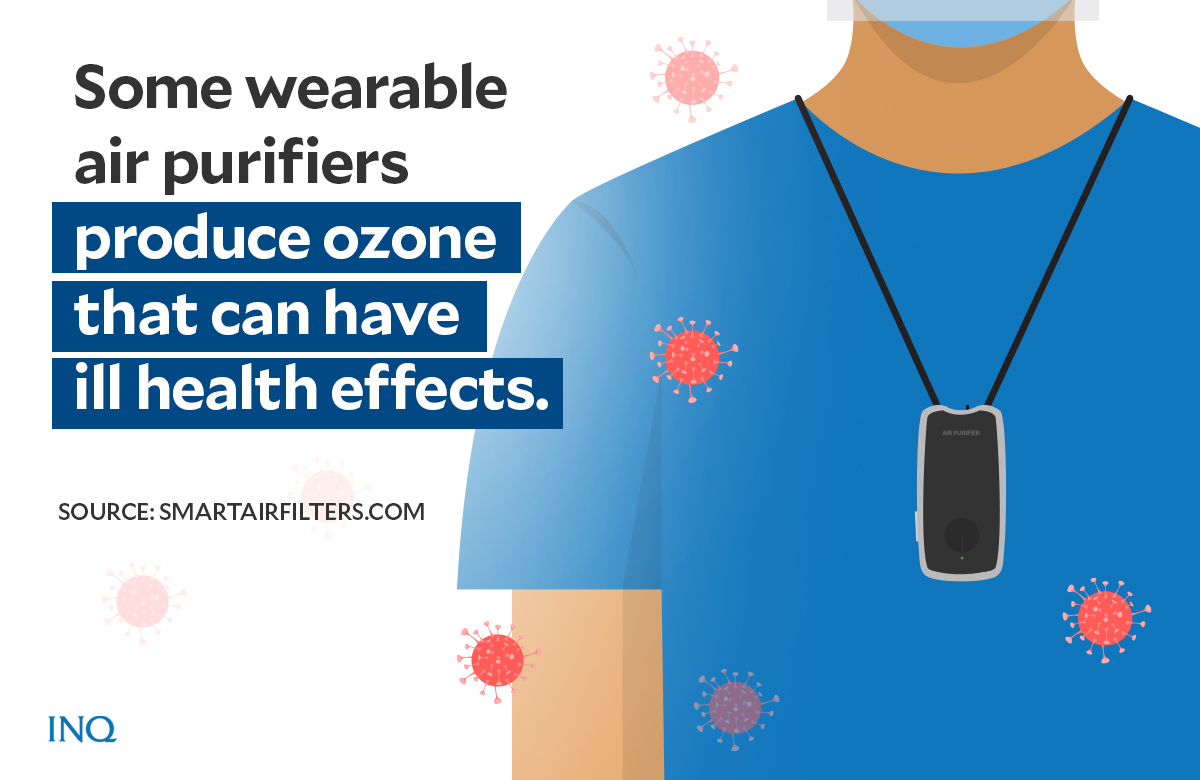As wearable air purifiers grow popular, science can’t show proof it works vs COVID

GADGET BELIEVER. President Rodrigo Duterte is seen wearing a necklace air purifier as he delivers his last state of the nation address on July 6, 2021. MALACANANG PHOTO
MANILA, Philippines—Philippines President Rodrigo Duterte may have unwittingly boosted the popularity of wearable air filters after he was seen several times in public wearing the gadget that looked like a necklace with an oversized pendant.
The growth in popularity of the gadgets can be gleaned in the number of brands, or types, that had emerged in online shopping sites, many made in China and claiming to have anti-virus features.
The types and brands of wearable air filters outnumber the variants that mutated out of SARS Cov2, the virus that causes COVID-19 and against which the gadgets claim they could protect wearers from.
The gadgets’ prices range from at least P800 to P8,000 per piece, according to a survey of online shopping sites.
The wearable devices, however, could end up just being a fashion fad as experts, including the Philippines’ Department of Health (DOH), were one in saying there’s no scientific proof that the gadgets work.
Article continues after this advertisementSome Philippine officials have bought into the gadgets’ claims.
Article continues after this advertisementIn Cebu, the governor required public utility vehicle (PUV) drivers to wear the gadgets when plying PUV routes.
READ: Cebu PUVs, drivers required to use air purifiers
The DOH, however, declared that the gadgets may not provide protection at all against COVID-19 and worse, could just bring a false sense of security to the wearer.
READ: Handy air purifiers offer false sense of security vs COVID-19 — DOH
The requirement for PUV drivers in Cebu province to wear the gadgets led to many to cancel their trips. Many Filipinos were also left wondering if the gadgets work at all.
Categorical statement
“The DOH does not recommend these air purifiers, these necklace purifiers,” said Health Undersecretary Ma. Rosario Vergeire, DOH spokesperson.
“While it is not harmful, it does not provide protection against COVID-19,” she said.
“We do not recommend the use of necklace air purifiers because based on evidence and experts, it does not provide protection,” she added.
According to the chief pathologist of DOH in Central Visayas, wearable air purifiers must not be used or even considered as alternative protective measures against COVID-19.
READ: Air purifiers not alternative to health protocols, says DOH7 exec
There are no scientific studies that would show air purifiers, whether wearable or the bigger versions used at home and hospitals, are effective against COVID-19.
Those being used in homes, offices, stores or medical facilities are mostly fitted with a filter called high-efficiency particulate air (HEPA).
These could “theoretically remove at least 99.97 percent of dust, pollen, mold, bacteria and any airborne particles with a size of 0.3 microns” which are not visible to the naked eye, according to the US Environmental Protection Agency (US EPA).
Air purifiers with HEPA filters had been recommended in 2003 by the Hong Kong Hospital Authority during the SARS outbreak in the territory to reduce virus transmission among health workers in facilities that had no isolation wards.
Sucking up air
James Dickerson, chief science officer of Consumer Report, said “HEPA filters are very efficient at catching coronavirus-size particles but the particles must first physically travel to the filter.”
But since there’s no way to tell which direction viruses would travel, air purifiers with HEPA filters need to continuously suction enough air to reduce virus particles in a room.
There is no research or study that would support claims that these types of air purifiers can prevent SARS Cov2 transmission.
Air purifiers can filter our viruses in the air but this does not guarantee effectiveness in preventing COVID-19.
Health Desk, a public health initiative of the technology nonprofit group Meedan, said mini air purifiers dangling from necklaces “have not been shown to prevent COVID-19 infection and there have been no studies about their effectiveness to date.”
Bigger air purifiers using HEPA filters “can help reduce tiny parts of a virus in the air in a home or confined space if they are used correctly,” said Health Desk. “But they are not enough to protect people from COVID-19,” it said.
Using an air purifier at home or as a wearable device does not do any harm but, again, there’s no scientific data that these would work against COVID-19.
The technology being used for bigger versions and the wearable types of air purifiers is different, according to the website SmartAirFilters.Com, a company that develops industrial grade or commercial use air purifiers.
While the bigger air purifiers use HEPA filters, the ones attached to necklaces as a wearable device use ionizers, according to SmartAirFilters.
Tests in China, California
It said that scientists in China and California conducted tests on four types of wearable air purifiers by placing each purifier inside a chamber which is less than one square meter. The scientists measured how each wearable gadget was able to remove microscopic particles in the air.

Graphic by Ed Lustan
“The results? Three of the four wearable ionizers tested removed less than 10 percent of particles 20 cm away from it,” said SmartAirFilter.
“Ten percent protection isn’t great and far lower than the 95 percent virus protection you get from wearing a mask,” said the company.
The China and California tests, SmartAirFilter said, were tested in an enclosed space with no moving air. “It’s likely these wearable air purifiers would perform even worse when worn around the neck in the real world,” it said.
SmartAirFilter said while it is widely believed that there’s no harm in wearing air purifier necklaces, these gadgets actually can do harm.
It said various studies had shown that wearable purifiers create ozone, which is created by a combination of three oxygen atoms. “Ozone is harmful to humans and can damage lungs,” said SmartAirFilter.
“The exact amount of ozone created by each personal purifier can vary widely, but the average consumer has no way of knowing for sure the levels of ozone created by their device,” said the company.
“The exact amount of ozone created by each ionizer can vary widely, but some have been shown to produce harmful levels,” said SmartAirFilter.
“Some marketers have tried to sell the consumer that the ozone produced by ionizers is different than other ozone, and therefore not harmful. This is false,” it said.
It said ozone produced by wearable purifiers could have other serious health risks. Ozone can react with chemicals in personal care products and produce dangerous byproducts like formaldehyde and PM2.5, or particulate matter.

Graphic by Ed Lustan
“All of these would be taking place in the head region,” said SmartAirFilter.
It said ionizers, like wearable purifiers, “work by making pollution stick to nearby surfaces, removing them from the air.”
“But if the nearest surface is your body, there’s a problem,” the company said.
“When wearing an ionizer air purifier, your face, body and clothes act as the magnet for the pollution to stick to,” it said.
“This could result in dirty clothes and skin, or even breathing in more pollutants than you otherwise would,” SmartAirFilter said.
One Philippine online shopping site showed wearable air purifiers as among the best-selling products, possibly because of the pandemic.
At a grocery store in Makati City, a cashier was asked if the purifier dangling around her neck was effective.
She just smiled and said: “Prayers are also helpful.”
TSB
For more news about the novel coronavirus click here.
What you need to know about Coronavirus.
For more information on COVID-19, call the DOH Hotline: (02) 86517800 local 1149/1150.
The Inquirer Foundation supports our healthcare frontliners and is still accepting cash donations to be deposited at Banco de Oro (BDO) current account #007960018860 or donate through PayMaya using this link.